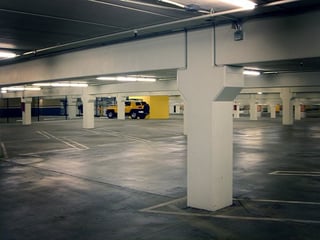
So you’re thinking about investing in an epoxy floor coating for your industrial or commercial facility. You want to make the most of your time and money, and you certainly don’t want to have to repeat the process again in just a year or two.
So how long is the lifespan of an epoxy floor coating? Let's take a look.
Average epoxy lifespans for industrial settings
Epoxy flooring systems are hard, abrasion-resistant, and have high-impact strength. Due to the excellent properties of an epoxy flooring system, some technicians refer to epoxy as "a coating for life". Unfortunately, this is a bit of false advertising.
In residential cases, some epoxy floor coatings have been known to last for 30 years, but industrial and commercial settings are generally subject to much higher rates of vehicular and foot traffic, as well as spills, accidents, or other issues that can wear epoxy down faster.
For these reasons, most industrial epoxy applications last between 5 to 10 years, though occasionally they last longer.
Factors that influence how long an epoxy coating lasts
There are many factors that influence an epoxy coating's lifespan:
- The Strength of the Concrete Flooring Itself: The initial layer of concrete is the base of your floor, and is the first factor that will determine the lifespan of your epoxy floor coating. Usually, concrete floors in industrial or commercial establishments have a minimum strength of 3000 PSI. A concrete floor with a strength of 2500 PSI or less is not recommended. If needed, densifiers can be added to help with this issue.
- Surface Preparation: One of the main prerequisites of a well-performing epoxy flooring is going to be how thoroughly the surface was prepared before application. The surface should be free from dust, oil or other liquids, and should have no damage. (Here are the elements a proper surface preparation process entails.)
- TheThickness of the Epoxy: An epoxy coating can range from 400 to 1,000 microns on industrial floors (that is, between 0.4 mm and 1 mm). The thinner your epoxy coating is, the sooner it is likely to wear down and need replacement. In some industrial settings, the thickness of epoxy system can sometimes exceed 1,000 microns.
- Quality of the Topcoat: Often a floor coating contractor will recommend the epoxy have a urethane topcoat applied to resist abrasion and scratches. A thickness of 50 microns or more is recommended in industrial floors.
- Extent of Traffic: High levels of pedestrian traffic can wear down even a well-installed epoxy coating. Forklifts and other wheeled vehicles will take its toll as well. If your facility will be subject to heavy traffic, consider an additional topcoat.
- Exposure to UV Light: Epoxy floor coating has very poor UV resistance. The binder will chalk, turning powdery when exposed regularly to sunlight. This is why epoxy coatings are not typically recommended for exterior applications.
When will your existing epoxy floor coating need to be replaced?
Indications that your epoxy floor coating is wearing down include localized breakdowns of the coating or miniature cracking appearing in certain areas of the surface. If you notice either of these issues or any other signs that your flooring is beginning to deteriorate, you'll need to call in a floor coating professional to take a look.
Have more questions about whether epoxy floor coatings are right for your facility? Check out these relevant epoxy blog articles, or visit our epoxy information hub.

